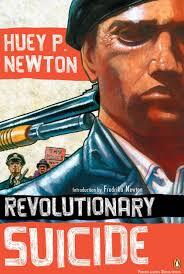- Biography
- >
- Revolutionary Suicide by Huey P. Newton
Revolutionary Suicide by Huey P. Newton
Originally published: New York: Harcourt Brace Jovanovich, 1973.
Born the son of a Baptist minister in 1942 in Monroe, Louisiana, Huey P. Newton moved to Oakland, California, with his family at the age of three. Although functionally illiterate upon graduating from high school, he taught himself to read by studying Plato's Republic. Newton enrolled at Oakland City College, where he campaigned successfully to have black history included in the curriculum. While at the college, he became familiar with the writings of Marx, Lenin, Frantz Fanon, and Chairman Mao. In 1966, with Bobby Seale, Newton co-founded the Black Panther Party for Self-Defense, an organization in which Newton served as minister of defense. Though perhaps best known for their community street patrols, which openly displayed loaded firearms, the Black Panthers also sponsored breakfast programs for poor children and provided shoes and health care for the needy in the black community. Convicted in 1968 of manslaughter in the shooting death of Oakland police officer John Frey in 1968, Newton spent more than a year and a half in prison before his conviction was reversed. After a series of mistrials, the case against Newton was voluntarily dismissed. After reaching its high-water mark in 1970, when it claimed several thousand members, the Black Panther Party steadily declined, undermined in part by the efforts of the FBI. Accused of another murder in 1974, Newton jumped bail and spent the next three years in Cuba, after which he returned to the United States to stand trial and was acquitted of the charge. Newton earned a doctorate from the University of California, Santa Cruz, in 1980. He was shot to death by a gang member in 1989.
Jacket Description/Back:
In October 1967, one year after the founding of the Black Panther Party, Huey Newton was involved in a shooting during which an Oakland police officer was killed. Newton spent three years in prison before being released and having his charges dismissed, and his jailing brought cries of "Free Huey" from supporters around the world. This engrossing and well-written autobiography recounts the forming of a revolutionary and shows how the degrading and psychologically destructive penal system forged Newton's already growing spirit. When Newton was a child, his father instilled in him a sense of dignity and pride; as an adolescent, he was torn between religious principles and life as a hustler; as a young man, he founded the radical Black Panther Party with Bobby Seale, and finally, in solitary confinement in the Alameda County Jail, he reached deep within himself to find the strength to face adversity; and even death without fear.




